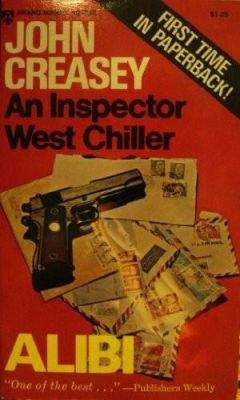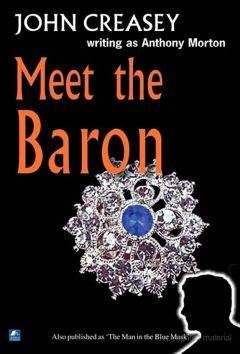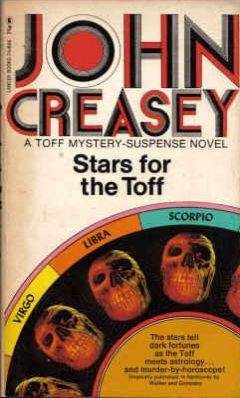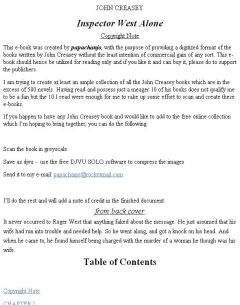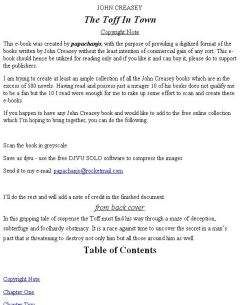John Creasey - Gideon’s Sport
На сайте mybooks.club вы можете бесплатно читать книги онлайн без регистрации, включая John Creasey - Gideon’s Sport. Жанр: Прочее издательство неизвестно,. Доступна полная версия книги с кратким содержанием для предварительного ознакомления, аннотацией (предисловием), рецензиями от других читателей и их экспертным мнением.
Кроме того, на сайте mybooks.club вы найдете множество новинок, которые стоит прочитать.
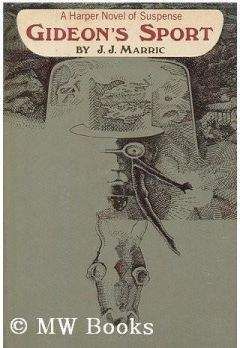
John Creasey - Gideon’s Sport краткое содержание
Gideon’s Sport читать онлайн бесплатно
Not only the police and Aunty Martha were preparing for June’s great sporting events; the bookmakers were expecting to be very busy. The volume of betting on cricket, tennis and golf was negligible, of course, compared with the amount on racing, boxing, the speedways and the dogs. But there were very good pickings and the big bookmakers always quoted prices on the major events.
There were some surprising odds offered and taken, for instance, on the best players at Wimbledon, who were ‘seeded’ so that they could not be drawn against each other in the early rounds of the tournament. This year, there was more betting than usual; partly because of the big money prizes which put the professionals high among the seeded players, yet gave amateurs a powerful incentive to win. There were also prices, fairly even, on who would win the cricket series between South Africa and England by winning most matches out of five.
There were hundreds of small bookmakers in London, but only three major houses. Of these, Jackie Spratt’s was a law unto itself. The others were wholly reputable and trustworthy, despite rumours that they would ‘fix’ this fight or that race. It wasn’t simply that bookmakers were as honest as any other businessmen; it was that they were particularly vulnerable to any rumours of dishonesty or fixing. The police knew this as well as anybody, and since the new Gaming Act had come into force and betting was easier to conduct legally, a camaraderie had been built up between the police and the bookmakers as individuals, as well as through their main association.
On that particular evening, while Gideon was sitting in his Fulham garden, trying to get cool, and Martha Triggett had cancelled a Charm School session because it was so hot, two of the Big Three bookmakers sat on the terrace of the Royal Automobile Club, drinking cold beer.
One, Sir Arthur Filby, was tall, handsome, grey-haired and aristocratic in appearance. The other, Archibald Smith, looked the prototype of the typical musical comedy bookmaker-big, overweight, red-faced and with a neck so thick that there were always two rolls of fat at the back, lurking above his invariably over-loud, over-check suit. His grey hair was cut so short that at a distance he appeared almost bald; at close quarters, it bristled.
“We had an odd one in, today,” he remarked, owlishly.
“Concerned with what?” asked Filby.
“Barnaby Rudge.”
“The tennis chap, you mean?”
“The darkie,” Smith nodded, “from Alabama.”
“What’s so odd about him?” Filby queried, blankly.
“Didn’t say odd about him, old boy! An odd one about him. Ten thousand pounds on any odds the chap could get, that Rudge will win Wimbledon.”
“Take it!” urged Filby, promptly. “He hasn’t an earthly. Even at a hundred to one, you’d pick up ten thou. Want to hedge some of it?”
“I want to know more about it.” Smith’s deep-set, periwinkle-blue eyes had a speculative glint. “I checked around a bit. No one else has been approached. The general feeling was a hundred to one others — and he’s one of them!”
“Humph,” ejaculated Filby.
“And if he won,” Smith pointed out, “someone would be a million down!”
Filby sat up, contemplated his glass as if suspicious of its cleanliness, and then looked hard at Smith.
“I see what you mean,” he said. “Impossible.”
“A pony,” Smith shrugged. “Even a hundred. Possibly a thousand quid — I could understand anyone putting it on as a long shot. But ten thousand! That isn’t chicken-feed, even to a millionaire.”
Filby sipped, stared moodily at his glass, tossed the drink down and raised a hand for a waiter.
“Who’s behind it?” he asked.
“I’ve no idea.”
“No name? Same again, by the way?”
“Ta. I can manage one more.”
Filby raised two fingers and as the waiter turned and went off, he echoed: “No idea?”‘
“Oh, I know who wants to put the money up.”
“Cash?”
“You’re not very bright tonight, old boy!” Smith protested. “You don’t think anyone would be expected to take that on credit, do you?”
“I must be drinking too much,” Filby murmured. “But really! Who wants to risk his ten thou?”
“A man named Lous Willison. An American.”
“What’s he do?”
“He’s a builder.”
“From Alabama?”
“Not bad,” Smith shot Filby a glance that was half-wondering, half-amused. “Yes — Alabama and Georgia.”
“Is he in a big way?”
“As a builder, I don’t know. I checked with the American Consulate, Trade Division — said I was contemplating putting up a factory there and I’d been recommended to use Willison. They gave him a perfectly good reference but said he wasn’t a very big operator.”
“Black or white?”
“What do you mean?” Smith asked, then suddenly saw the implication and said shortly, his voice hardening: “White. But what difference does that make?”
“Could make a lot,” replied Filby, soothingly. “If there’s a group of negroes who would like to see their man win Wimbledon —” He broke off, choking back a laugh. “Could be they’ve got a bombshell and see Wimbledon as a terrific race symbol?”
“As a matter of fact,” Smith told him, soberly, “it could have a bloody big impact-don’t make any mistake about that. And when you get a good negro athlete-look how nearly Ashe pulled it off! How long ago was that?”
“Last year. The question is, did you take the bet?”
“I stalled.”
“Lay it off with the smaller boys, Archie,” Filby advised, as if tiring of the subject.
“Not yet.” Smith’s mind was obviously quite made up. “First, I want to know if anyone else is putting heavy money on Barnaby Rudge. Barnaby Rudge,” he repeated, in a puzzled way. “Isn’t that name familiar?”
“You could read a chap called Dickens,” Filby said drily. “All right, I’ll keep my antennae out, and pass on any news.” Their drinks had been set down as he spoke and he handed Smith his and then raised his own. “Cheers. How’s the money shaping, on the Derby?”
Smith frowned. “Damn queer about that, too,” he complained. “Something’s up.”
“That’s what my scouts and my books keep telling me.” Filby squinted at his glass, then drank deeply. “And that’s very worrying, Archie — that could really take us. If you ask me . . .”
CHAPTER THREE
The Old Steps
The Old Steps, at Limehouse, was one of the most celebrated and popular public houses in the East End of London, for at least three reasons. It was in Wapping High Street, overlooking the Thames-not far from the Headquarters of the Thames Division of the Metropolitan Police — and a very old, very narrow alley which ran down beside it to steps and a jetty contributed to an ‘atmosphere’ of gas-lit eeriness.
Indeed, by night the approach at least was gas-lit, for the publican retained the gas lamps in the alley and over the doorways. It was a ‘free house’: not tied to a brewery or chain, but independently-owned and so able to dispense every conceivable kind of beer and spirits. What was more, it boasted a pianist: one of the best in London. He was young, but adept in the tradition of the late Victorian and Edwardian ages, and every night was chorus and sing-song night. The pianist, a pale, hunched little man, could play almost any’ tune by ear or from long practice, with the kind of beat which made everyone join in the singing: he himself seemed to put every ounce of energy into his playing.
He was at the piano when Chief Superintendent Lemaitre entered, that evening, to a roar of voices singing: “. . . give me your answer, do!”
Lemaitre began to hum as he pushed his way through the smoke-blue haze towards the saloon bar. No one appeared to take especial notice of his progress, but at least three pairs of eyes turned towards him, half-furtively. Lemaitre was quite aware of it. He looked like an ageing sparrow in his pale brown suit and spotted red and white bow tie; thin-faced, spare-boned, his sparse, dark hair slicked down. Without appearing to notice, he knew that one expert cracksman, one well-known shop-lifter and a man who made his living by stealing fruit from the wholesale markets, was in the saloon. Two were alone, one was with his wife. In a far corner were two detective-sergeants from the Thames Division, and one raised his hand. Lemaitre gave him the thumbs-up sign, and began to hum:
“I’m half-crazy, all for the love of you! . . . Half of light, Joe . . . It won’t be a stylish marriage, I can’t afford a carnage .., My old dutch been in?” he wasn’t expecting his wife, but he wanted the barman and everyone within earshot to think that he was. “. . . upon the seat of a bicycle built for two . . . ! Ta.”
“Ain’t seen her,” grunted the barman.
“Out with her latest and finest, I suppose,” said Lemaitre. “Women!” He tossed down half of the beer. “Cheers.”
He looked about the crowded room at fifty or sixty faces, but could not find the man he had come to see: the ‘accidental’ meeting had been arranged by telephone. He had no doubt that his informant, a man named Charlie Blake, knew what he was talking about. And tonight he was to pass on the names of the people planning the doping of Derby runners.
Charlie wasn’t among the crowd, now clapping and cheering as the pianist took first a bow and then a drink from a pewter tankard on top of the old, burl walnut piano. People were calling out:
“Give us another, Tommy!”
“How about a bit of pop, for a change?”
“Never heard of the Beatles, Tommy?”
“Give us ‘My Old Dutch’,” one old woman called. “Me and me old china’s bin married fifty years.”
“You never got married in your life!” another oldish woman yelled, and the resultant roar of laughter was almost deafening. A man’s voice sounded above the din.
“Her six kids’ve got something to complain about, then!”
There was another eruption of laughter, everyone joining in. The-potmen moved about, carrying trays crammed with glasses and tankards, showing unbelievable balance and dexterity. The bar itself was so crowded that Lemaitre was pressed hard against a corner. He lit cigarette after cigarette from the previous butt and kept glancing at the door, ostensibly on the look-out for his wife. But Charlie Blake did not come.
An hour earlier, Charlie Blake had left his tiny house in Whitechapel and started out for the Old Steps.
He was a man in his middle fifties, not unlike Lemaitre to look at, but smaller and more dapper, with thick hair, dyed jet-black, and slightly fuller in the face. A card-player of remarkable skill, he crossed the Atlantic two or three times each year, playing cards and making nearly enough money to live by. He made still more by picking up racing information and passing it on. He knew better than most people how much loose talk there was in the big smoking-rooms of the transatlantic liners, especially at the end of an evening of heavy drinking, and he made full use of this.
He was in many ways a nice little man. His wife was fond of him, although she entertained lovers quite shamelessly whenever Charlie was away. She kept his small but pleasantly-appointed house in good order, and fed him well. He was generous with the children of his neighbours -he himself was childless — and he greatly enjoyed walking.
On this hot summer night, he was dressed as coolly as anyone in London, wearing a beige-coloured linen jacket and tropical-weight trousers, with openwork brown-and-white shoes. Now and again he eased his collar: the heat always gave him a rash on the neck and he used a special ointment to soothe the irritation; but in such heat as this, the collar seemed to stick to the ointment. He walked quite briskly and it did not enter his mind that he was in any kind of danger.
Still less did the possibility of danger occur to him when he saw a taxi driven by an acquaintance pull up.
“Want a lift, Charlie?”
“I’m okay,” he said cheerfully. “My plates of meat are good for a lot of miles, yet!” He looked down at his<brown-and-white shoes.
“Give yourself a rest,” urged the driver. “Hop in!”
He was at the kerbside, and it was very hot and although he would never have admitted it, Charlie’s feet were not as comfortable as usual. And free rides did not come every day. So he opened the door and got in — and stumbled over the leg of a man sitting tucked away in the corner behind the door.
“What the hell . . . I” he began, but before he could go on the man hit him a vicious blow on the side of the head.
He gasped and flopped down. In a flash, his assailant had his right arm twisted behind him in a hammer-lock, forcing him into a curious, half-kneeling, half-crouching position.
Charlie, sweating freely, tried to turn his head, but he could not see his captor’s face.
“What — what’s going on?” he squeaked.
‘‘Just answer a few questions, Charlie,” the man said.
“Who — who are you?”
“Never mind who I am. What have you been telling the cops?”
“I-I never tell the cops anything, I-God! Don’t!” The man had twisted his arm so hard that it felt as if it would snap.
“You’ve been talking to Lemaitre,” the man stated, flatly.
Charlie was so astonished that he did not even deny it.
“What was it about, Charlie?” The calm voice was very insistent.
“It-it wasn’t anything, I-don’t do that!” he shrieked. “You’ll break my arm!”
“That isn’t all I’ll break if you don’t tell me the truth!” threatened the man in the corner. “What did you tell Lemaitre about?”
“It-it wasn’t—” Charlie gasped again and then almost screamed, the pain was great. “It was only a joke! I told him some Derby horses were going to be fixed-it was only a joke!”
“That’s one of the best jokes you’ve ever told,” the man said, and for the first time he sounded deadly. “What exactly did you tell him?”
“It was a joke! I never told him anything!”
“Who told you about the doping?” The tormentor demanded.
“I — I heard a coupla chaps talking on the QE 2. You know, the new Cunarder. But it was only a joke, I tell you!”
“Charlie,” said the other, “you’ve been nosing around one of Jackie Spratt’s shops for two days, picking up a lot of information about things you shouldn’t know about. Who’s going to dope the horses?”
“I-I don’t know, I tell you! I don’t know!”
“So why are you going to the Old Steps tonight? To see Lemaitre?”
“No! Oh, God, no!”
The taxi was bumping along a cobbled road, which told Charlie that they were among the docks and warehouses, probably near the Old Steps. Now and again another car passed, but there was little sound; few people came along here in the evening. The rumble of the bumping drowned other sounds and in any case Charlie Blake was in such a state of mortal terror that the words he uttered were little more than hoarse whispers. But there was a tiny segment of his mind not frozen by the terror, and all his thoughts passed through this.
Who had told this man? Who was he? Why had they been watching him? How did he know about Lemaitre?
Похожие книги на "Gideon’s Sport", John Creasey
John Creasey читать все книги автора по порядку
John Creasey - все книги автора в одном месте читать по порядку полные версии на сайте онлайн библиотеки mybooks.club.
